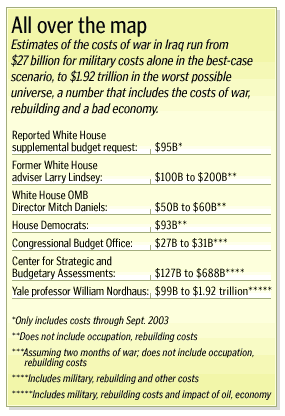NEW YORK (CNN/Money) -
Though speculation about the possibility of war in Iraq has finally ended -- it's happening, and soon -- there's still one mystery that remains to be solved: How much it will cost?
Saddam Hussein has rejected President Bush's call to leave Iraq or face war, and U.S. troops are moving into position for the start of a conflict, which may be delayed by the weather. (Click here for full coverage from CNN.com).

Bush has so far avoided answering questions about the possible costs of war and rebuilding in Iraq, saying he believes the costs of not acting to disarm and remove Saddam from power outweigh the costs of doing so.
"In terms of the dollar amount, we'll let you know here pretty soon," Bush said at a news conference earlier this month, adding that his administration's estimate of the cost of war would come in a supplemental budget request to Congress, "at the appropriate time."
Democrats have criticized Bush for his reticence and warned that the costs of war could dramatically worsen the federal budget, which is already expected to record the highest deficit in history this year.
Earlier this month, CNN reported that White House officials working on that supplemental request might ask Congress for up to $95 billion to cover two months of war, post-war costs through September and aid to other countries in the region.
White House won't talk about cost
Administration officials have occasionally hazarded guesses about the costs, but the administration has been quick to distance itself from those guesses.
In September 2002, former Bush economic adviser Larry Lindsey said war could cost between $100 billion and $200 billion, speculation that was immediately dismissed by White House Office of Management and Budget Director Mitch Daniels.
Daniels himself said in December that war could cost between $50 billion and $60 billion, but quickly clarified that it was impossible to tell how much the war might cost and that he was simply trying to compare a new war with its only close historical precedent, the first Gulf War, which cost about $60 billion.

Last fall, Democrats in the House estimated war could cost $93 billion. The bipartisan Congressional Budget Office (CBO), however, said the war would only cost between $9 billion and $13 billion for initial troop deployment and another $9 billion a month thereafter.
As a measure of just how wide the range of possible costs is, the Center for Strategic and Budgetary Assessments, another nonpartisan think tank, said in February that war could cost between $18 billion and $85 billion, that five years of post-war occupation could cost between $25 billion and $105 billion, and that humanitarian and other relief efforts could cost between $84 billion and $498 billion.
Many observers have criticized the Bush administration for keeping Americans in the dark about these potential costs and the possibility that it could take several years and many billions of dollars to rebuild Iraq and help it restructure its government.
| Related stories
|

|
|
|
|
"U.S. officials have yet to fully describe to Congress and the American people the magnitude of the resources that will be required to meet post-conflict needs," said a report called "Iraq: The Day After," a report on the costs and consequences of rebuilding Iraq sponsored by the Council on Foreign Relations, a nonpartisan think tank.
The report, authored in part by James R. Schlesinger, defense secretary under Presidents Nixon and Ford, and Thomas R. Pickering, ambassador to the United Nations under the first President Bush, estimated that post-war rebuilding -- including reconstruction, humanitarian aid and the deployment of a minimum of 75,000 troops -- could cost $20 billion per year for "several" years.
Rebuilding help may not come
While U.S. coalition partners in the first Gulf War paid for much of that war's costs, it's unclear how much help the United States will get this time, especially after the long and sometimes bitter debate about war in the United Nations in recent months.
"European governments have a card they could play in the current crisis: token assistance in the rebuilding of Iraq, which would largely stick the United States and the United Kingdom with the entire tab," Wachovia Securities economist Jay Bryson wrote in a recent research note.
Some analysts have speculated that the sale of Iraqi oil could help defray some rebuilding costs, but it could take some time to get Iraqi oil fields up and running at full speed, and U.S. officials will want to avoid the appearance that they have commandeered Iraqi oil production and sales, the Council on Foreign Relations report said.
| Read the studies
|

|
|
|
|
These estimates do not include the potential costs or benefits of a post-war surge or drop in oil prices, nor do they include the potential costs or benefits of a post-war rebound or recession in the U.S. economy.
Yale professor -- and war opponent -- William D. Nordhaus, in a study published late last year, said a short and successful war for the United States and its allies could have a positive impact on oil markets and the economy that would shave about $57 billion from the total costs of the war.
On the other hand, in his worst-case scenario, assuming the war and post-war period go very badly, then the shocks to the oil market and economy could add a staggering $1.2 trillion to the total bill.
Nordhaus' range of total costs for the next decade ran from $99 billion in the best case scenario to $1.92 trillion in the worst case.

|

